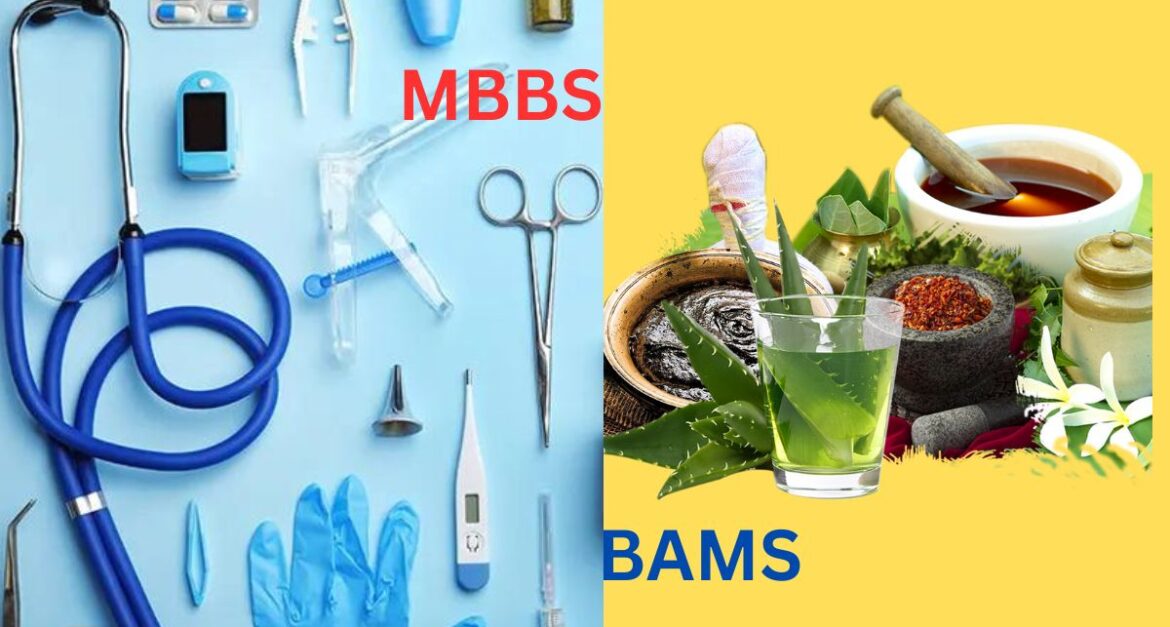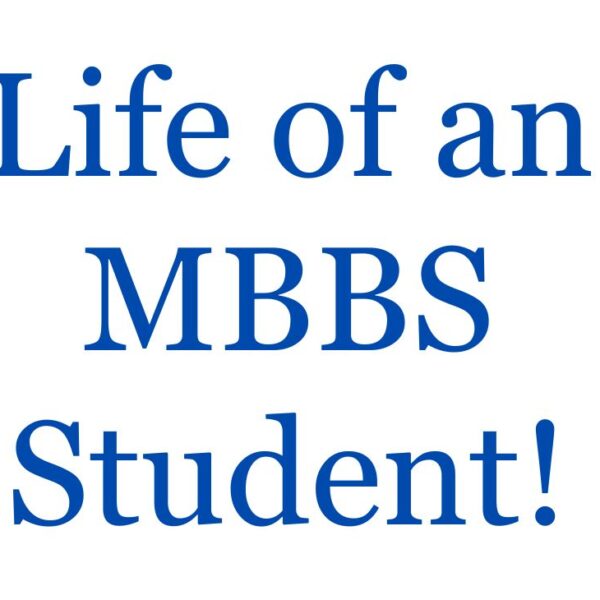
BAMS Vs MBBS
MBBS Stands for Bachelor of Medicine, Bachelor of Surgery whereas BAMS stands for Bachelor of Ayurvedic Medicine & Surgery. BAMS and MBBS are both undergraduate medical degrees, but they differ in their approach to medicine and the systems they are based on.
BAMS (Bachelor of Ayurvedic Medicine and Surgery):
- BAMS is a medical degree offered in India and other countries that follow the Ayurvedic system of medicine.
- Ayurveda is an ancient holistic healing system that focuses on natural remedies, herbal treatments, and lifestyle changes to promote health and treat illnesses.
- BAMS curriculum includes the study of Ayurvedic principles, medicinal plants, Panchakarma (detoxification techniques), and traditional therapies.
- Graduates with BAMS can become Ayurvedic doctors and practice Ayurvedic medicine.
MBBS (Bachelor of Medicine, Bachelor of Surgery):
- MBBS is a medical degree awarded in various countries, including India and most Western countries.
- MBBS follows the modern allopathic system of medicine, which emphasizes evidence-based treatments, pharmaceutical drugs, and surgery to diagnose and treat diseases.
- The curriculum for MBBS includes courses in anatomy, physiology, pharmacology, pathology, surgery, and other medical sciences.
- Graduates with MBBS can become doctors in various fields and have the option to specialize in specific medical disciplines through postgraduate studies.
Overall, BAMS focuses on traditional Ayurvedic medicine, while MBBS follows the modern allopathic approach. Both degrees allow graduates to become medical practitioners, but their methods and philosophies differ significantly. The choice between BAMS and MBBS depends on an individual’s interest in and preference for the specific medical system they wish to pursue.
BAMS Vs MBBS: Overview
| Course | MBBS | BAMS |
| Full Form | Bachelor of Medicine, Bachelor of Surgery | Bachelor of Ayurvedic Medicine & Surgery |
| Duration | 5.5 Years | 5 years 6 months |
| Eligibility Criteria | 50% or above in 10+2 in PCM/PCB with English as a mandatory subject | 10+2 with a minimum of 50%. Compulsory subjects include Physics, Chemistry, Biology |
| Average Fees | INR 5-12 Lakhs per annum (Approximately) | INR 1-3 Lakhs per annum (Approximately) |
| Admission Criteria | NEET UG | NEET UG |
| Career Opportunities | Physician Doctor, Pathologist, Endocrinologist, Neurologist, Cardiologist, Gynecologists’ | Medical Representative, Pharmacist, Product Manager, Resident Medical Officer |
| Recruiting Companies | Fortis Healthcare Ltd, Medanta Hospitals, Munich Health Industries Co Ltd, Apollo Sun Pharmaceutical Industries Ltd, Cipla Ltd, etc. | Patanjali Ayurved Limited, Dabur, Zandu Pharmaceuticals Works Limited, The Himalaya Drug Company, Surya Herbal Limited, and other organizations |
BAMS Vs MBBS Admission Procedure in India
The admission procedures for BAMS and MBBS in India vary as they belong to different systems of medicine and are offered by different types of institutions. Here’s a general overview of their admission procedures:
BAMS Admission Procedure:
Entrance Examination: To get admission to BAMS courses, candidates need to appear for relevant entrance examinations conducted at the national, state, or university level. In India, the National Testing Agency (NTA) conducts the All India Ayush Post Graduate Entrance Test (AIAPGET) for admission to various Ayurvedic courses, including BAMS.
Qualification Requirements: Candidates must have completed their 10+2 education with Physics, Chemistry, Biology, and English as compulsory subjects. They should have obtained qualifying marks in the entrance examination to be eligible for BAMS admission.
Counseling Process: After the entrance exam results are declared, counseling sessions are conducted by the respective state or central authorities. Based on the ranks and marks obtained in the entrance exam, candidates are allotted seats in various Ayurvedic colleges.
MBBS Admission Procedure:
National Eligibility-cum-Entrance Test (NEET-UG): For admission to MBBS courses in India, candidates must appear for the NEET-UG examination, which is conducted by the National Testing Agency (NTA). NEET is the common entrance exam for undergraduate medical courses in India, including MBBS.
Eligibility Criteria: To be eligible for MBBS admission, candidates must have completed their 10+2 education with Physics, Chemistry, Biology, and English as core subjects. They should have obtained qualifying marks in NEET-UG.
All India Quota and State Quota: The counseling process for MBBS admission is conducted in two categories – All India Quota (15% seats) and State Quota (85% seats). For All India Quota seats, the Directorate General of Health Services (DGHS) is responsible for counseling, and for State Quota seats, the respective state counseling authorities handle the process.
Central and State Counseling: Based on their NEET-UG ranks, candidates are called for counseling where they can choose their preferred medical colleges and courses. The counseling process for MBBS admission is conducted online.
It’s important to note that both BAMS and MBBS courses have limited seats, and the competition for admission is generally very high. Aspiring students need to perform well in the respective entrance examinations to secure a seat in their desired course and college.
BAMS Vs MBBS Eligibility Criteria in India
The eligibility criteria for BAMS and MBBS in India differ due to the different nature of these courses. Here are the general eligibility criteria for each:
BAMS Eligibility Criteria:
Age: Candidates should have completed 17 years of age on or before December 31st of the admission year.
Educational Qualification: Candidates must have passed the 10+2 examination or its equivalent with Physics, Chemistry, Biology, and English as mandatory subjects.
Minimum Marks: To be eligible for BAMS, candidates should have secured the minimum qualifying marks in the 10+2 examination. The minimum marks requirement may vary from state to state or institution to institution.
NEET-UG: Most states and institutions require candidates to appear for the NEET-UG (National Eligibility-cum-Entrance Test for Undergraduates) conducted by the National Testing Agency (NTA) and obtain qualifying marks to be eligible for BAMS admission.
MBBS Eligibility Criteria:
Age: Candidates should have completed 17 years of age on or before December 31st of the admission year.
Educational Qualification: Candidates must have passed the 10+2 examination or its equivalent with Physics, Chemistry, Biology, and English as mandatory subjects.
Minimum Marks: To be eligible for MBBS, candidates should have secured the minimum qualifying marks in the 10+2 examination. The minimum marks requirement may vary from state to state or institution to institution.
NEET-UG: Admission to MBBS courses in India is strictly based on the NEET-UG scores. Candidates need to qualify in the NEET-UG examination conducted by the National Testing Agency (NTA) to be eligible for MBBS admission.
Both BAMS and MBBS courses have rigorous admission procedures, and candidates need to fulfill the specified eligibility criteria to be considered for admission. The NEET-UG examination is a common requirement for both courses, and candidates need to perform well in this examination to secure admission to their preferred course and college.
Moreover, specific states or institutions may have additional eligibility criteria, so candidates should refer to the respective admission guidelines for more details.
Why Choose MBBS & Why Choose BAMS?
Choosing between MBBS and BAMS depends on individual preferences, career goals, and interest in different systems of medicine. Here are some points to consider when deciding which course to pursue:
Reasons to Choose MBBS:
Allopathic Medicine: MBBS is based on the modern allopathic system of medicine, which is widely practiced and recognized globally. It focuses on evidence-based treatments, pharmaceutical drugs, and surgery to diagnose and treat diseases.
Broad Scope: With an MBBS degree, you can work as a medical doctor in various fields, including general medicine, surgery, pediatrics, gynecology, psychiatry, and more. You have the option to specialize in specific medical disciplines through postgraduate studies.
Global Recognition: An MBBS degree from a reputed medical college is recognized and respected worldwide. It opens up opportunities for international practice and further education.
Technological Advancements: Allopathic medicine is constantly evolving with advancements in medical technology, diagnostics, and treatments, offering a dynamic and challenging career.
Reasons to Choose BAMS
Ayurvedic Medicine: BAMS is based on the ancient Ayurvedic system of medicine, which focuses on holistic healing, natural remedies, herbal treatments, and lifestyle changes to promote health and treat illnesses.
Traditional Knowledge: BAMS provides a deep understanding of Ayurvedic principles, medicinal plants, Panchakarma (detoxification techniques), and traditional therapies. It allows you to explore traditional healing practices.
Holistic Approach: Ayurveda considers the mind, body, and soul as interconnected, and treatments aim to balance the body’s energies to restore health. It offers an alternative approach to healthcare.
Cultural Heritage: BAMS allows you to be part of preserving and promoting India’s rich cultural heritage and traditional healing practices.
Ultimately, the decision to choose MBBS or BAMS depends on your interests, passion for a particular system of medicine, and your long-term career goals. Both fields offer rewarding and noble careers in healthcare, contributing to the well-being of individuals and society.
It is essential to thoroughly research the curricula, career prospects, and job opportunities in both fields to make an informed decision that aligns with your aspirations.





